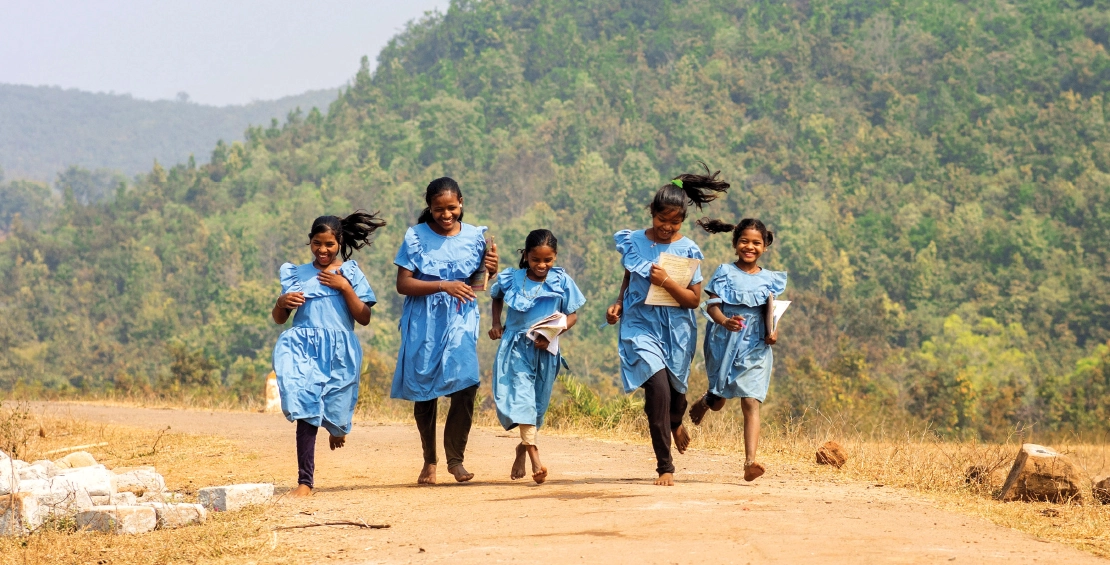
1,20,000
children
27
States
Right to Education, Learning, and Development (emotional, physical and mental) are fundamental human rights of all children below the age of 18 years as per the United Nations Conventions on the Rights of the Child (UNCRC). But millions of children are deprived of these basic rights for several reasons including conflict, natural calamities, ethnicity, disability, and above all poverty.
Smile Foundation was established with the prime intention of facilitating children to overcome these barriers and the prevailing inequity in society. The Right to Education (RTE) Act which came into force in 2010 made education free and compulsory for all children in the age group of 6-14 years. However, more than a decade later, the learning curve has not been steady for all children. The socio-economic conditions of parents and gaps in the learning infrastructure and environment in schools are hindrances which prevent many children from getting a proper education. The National Education Policy of 2020 has introduced some welcome and progressive changes that are positioned to make India’s education system more inclusive and holistic.
Smile Foundation’s education interventions are focused on helping children from difficult circumstances to have access to equal opportunities for school completion and equitable learning outcomes. Our programmes are aligned to the National Education Policy and aim to support the efforts of government to enhance accessibility of quality education for all children.
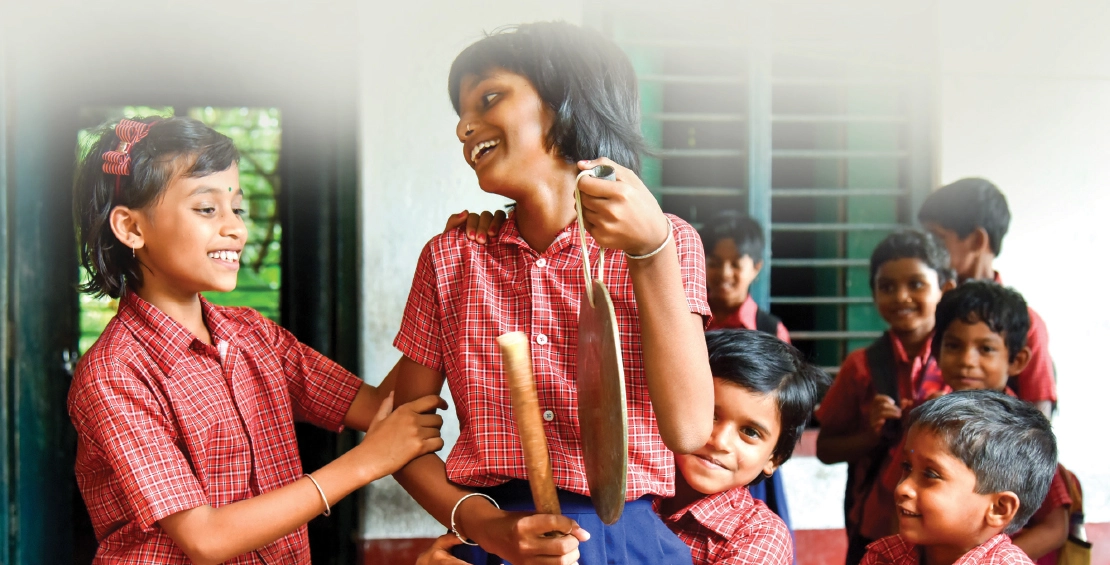
FLN & Grade-specific Learning Outcomes
STEM
Education
Enabling Learning Environment
Wellbeing
of Students
Need-based Teachers’ Training
Parent & Community Engagement
With the significance of STEM, activity based and technology driven learning increasing by the day, creative and innovative learning programmes have been introduced in collaboration with like-minded corporate, educational institutions and NGO partners. Building scientific temperament in students by introducing them to think critically, solve problems through inquiry and logic, ideate creatively and continue this process learning for a lifetime are critical skills for the youth and workforce of tomorrow. During the past year, vocational exposure has been encouraged and initiated amongst students to facilitate holistic learning and development by providing a space for students beyond regular curriculum subjects to enable children and youth to make connections between different areas of learning. Some of the initiatives are orientation to organic farming techniques, recycling of used clean clothes to make socially useful products, organic production of essential oils and other daily use products, and small-scale domestic repair and maintenance.
An exciting and fun learning environment contributes towards a positive and energetic interaction that in turn enables children to understand easily and retain the concepts well. The highlights of the initiative were:
The main aim of the teacher training sessions was to update and upgrade the teaching learning techniques and methodologies in teachers and help classrooms become more interactive, vibrant and fun. 72 stimulating and interesting engagements were conducted with more than 400 teachers and Principals. The major topics in focus were: Inquiry-based and activity-based learning. Classroom management, child pedagogy, and multilevel childcentric teaching. Experiential learning training on Maths & Science. Lesson planning and effective delivery of curriculum to achieve optimal learning outcomes. Stakeholder management, dealing with parents and community
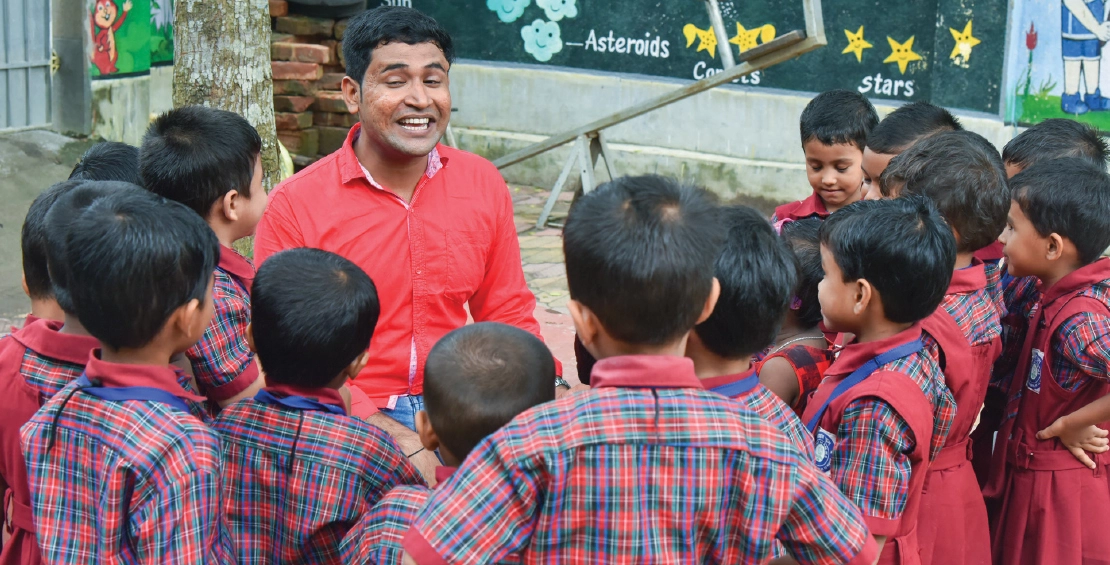
Government of India’s National Education Policy seeks to introduce students to vocational learning from Grade 6 onwards. Vocationalisation of secondary school education is an attempt to help students to visualize the extent to which they can make informed choices in life and career, channelize aspirations, and become market ready and employable. Smile Foundation’s Project Manzil, in collaboration with IPE Global, is a step in this direction.
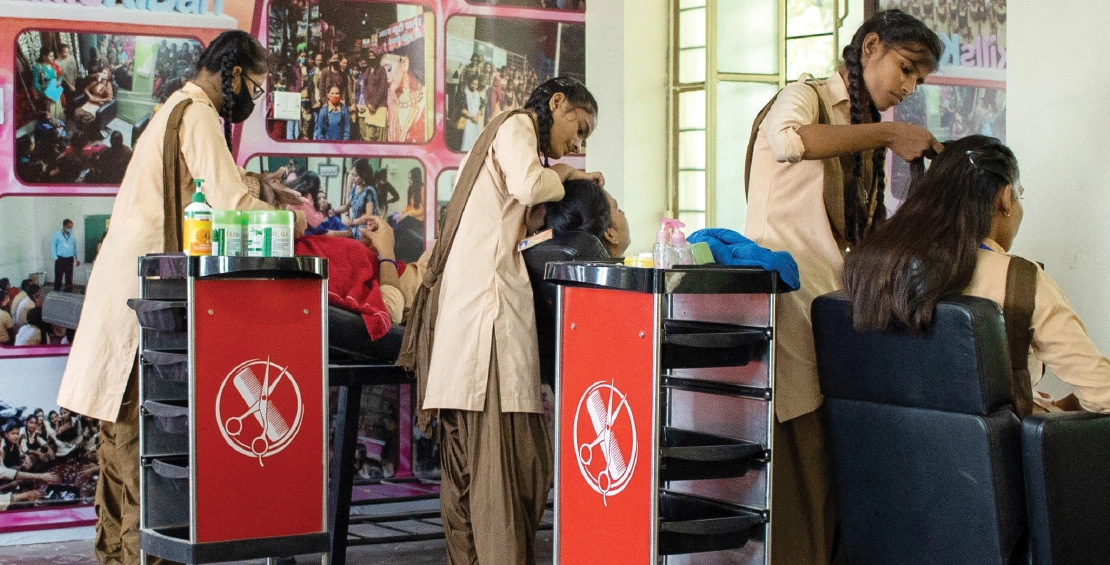
Under the Project Manzil, Smile Foundation aims to provide counseling and employability skills training to over 90,000 young girls in Rajasthan. The project provides training to girls in streams like IT, healthcare, beauty & wellness, security, retail, automobile, apparel, home furnishing, agriculture, tourism & hospitality, and electrical & electronics.
Overall, the project aims to empower adolescent girls to realize their career goals and educational aspirations by improving the quality of vocational education with a 3-pronged approach focusing on schools, students and industry. It also seeks to retain girls in school and reduce drop-out rates. Currently, the project is benefitting over 44,000 girls in grade 9-12 from Government schools in 6 districts of Rajasthan.
Skill-based training needs to become an important component of our education system—from schools, to universities. This will contribute to a holistic education of youth and create better workers and leaders for the future. Moreover, this will go a long way in addressing youth unemployment.
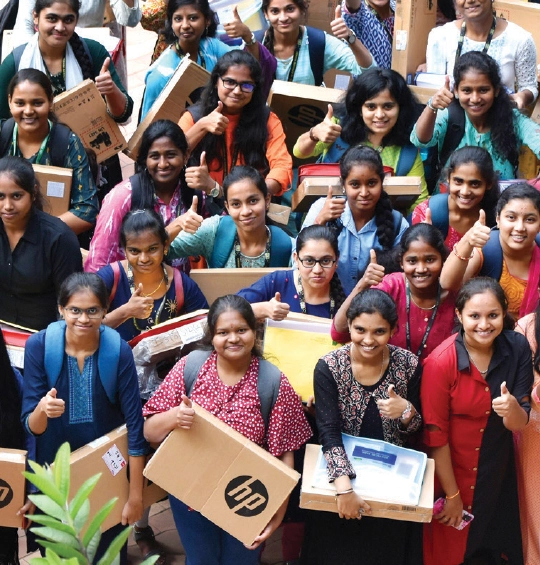
Currently, Smile Foundation operates six active scholarship projects in collaboration with esteemed donors including Deutsche Bank, Quantiphi, Quest Global, and Siemens. These projects collectively benefit over 2,000 students. Our commitment to increasing this figure ensures that more and more young men and women are granted the opportunity to excel in sectors with high growth potential and make a significant contribution to our development. Smile Foundation is committed to the long-term success of our scholars. A retention strategy is in place, including the regular review of academic performance, counseling services, and mentoring. We ensure that our students have the support and guidance they need to stay on their path to success. Some key features of these scholarship projects are:
Financial Assistance: We offer scholarships for the four-year duration of the engineering course, covering the tuition fee and ensuring that economic constraints do not impede their academic progress.
Learning Tools: Each scholarship recipient is provided with a laptop and other essential resources, ensuring that they have the technology required for online learning and research.
Employability Skills: The programme provides training in employability and communication, and internships to equip scholars with the skills required to not just graduate but to thrive in the competitive world.
Industry Exposure: Smile Foundation helps students visit the sites, offices, and different departments of potential employers based on their interests, education, and industry needs.
Domain Skills: Scholars are also provided with domain/technical skills training based on industry needs and in alignment with their chosen fields in the second year of the course.
Placement Assistance: Our scholarship programme provides placement assistance in the fourth year of the course and helps the scholars with aptitude tests, mock tests, and mock interviews.
Education has the power to not just empower children, but transform entire communities. With their parents striving hard to earn two square meals a day as daily wagers, education was never a priority for the tribal community living on the banks of the Malti river in Sambalpur, Odisha.
The centre was set up over two decades back and in the beginning several months were spent in simply spreading awareness and sensitise the community on the importance of education. After consistent door-todoor visits and mobilization drives, the first batch of students was successfully enrolled.
The early days were marked by substantial challenges. The community was only accessible through the river and the area remained isolated, with no roads and electricity. The community had to cross the river during the rainy season, navigating dangerous waters.
But the teachers and team at the centre were determined and they worked alongside the community to gradually bring changes and improve the quality of life for the people. At the same time, the centre created a child-friendly atmosphere, aiming for the holistic development of each child. Through interactive and activity based learning sessions, the teachers ensured regular attendance and retention in school. Co-curricular activities like music, yoga, sports and art were integrated within the curriculum to encourage holistic well being of the children. Regular health camps and WASH and nutrition awareness sessions were conducted to promote a health seeking behavior in children and their families.
From a modest beginning, the school has grown into a full-fledged educational institution today, with facilities for residential students and modern amenities over the years. Hundreds of students have received education, with many going on to pursue higher studies and secure government jobs. The transformation has been holistic, helping improve not just the educational status of children, but also bringing better economic stability, health and well-being to the entire community.
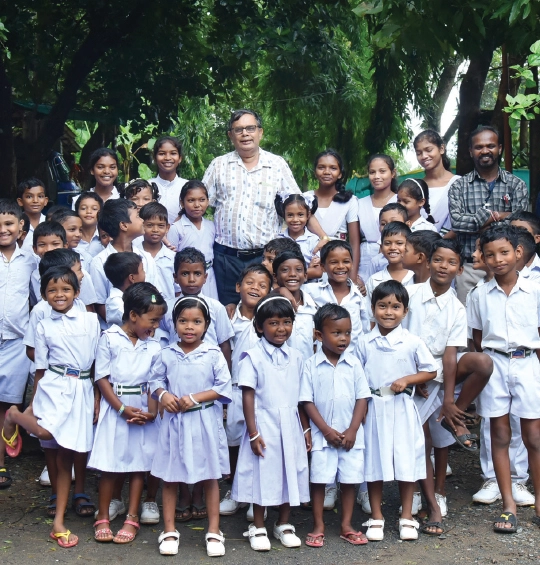
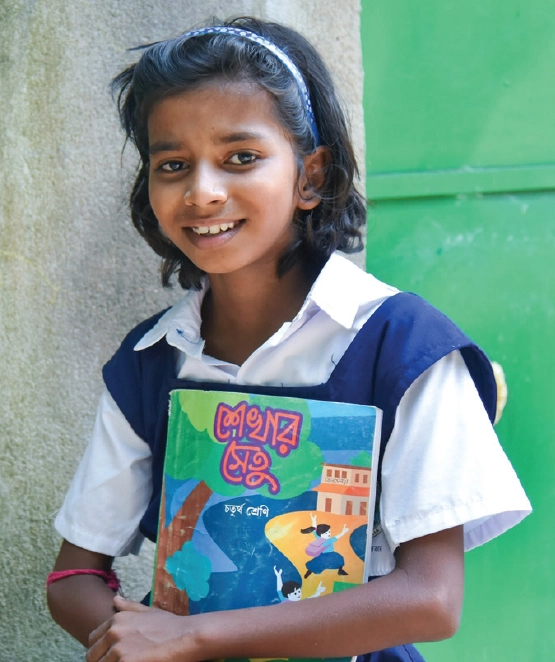
“My name is Bidisha, and my world revolves around two pillars of strength – my father and my mother. My father pulls a rickshaw every day. He’s really strong and never gives up, no matter how hard it gets. My mother, the heart of our home, battles a severe illness. Despite her weakening health, she radiates strength and love. Her courage is my guiding light. We find joy in small moments: shared laughter, stories at dinner, and the comfort of being together. I’ve learned from my parents to work hard and not lose hope, even when things are tough. They show me every day that no matter how tough life is, we can make it through together and come out stronger. I study in Class 6, and love to dance and sing.”
“Today I want to shine a light on the efforts and dreams of middle-class families. With limited resources, these families strive continuously to thrive in life. Whether it’s education, knowledge, or even simply laughter, their determination and never-say-die attitude are the real power behind their success stories. I come from one such family, and I want to share my story with all of you. My father is a tailor and the sole breadwinner. From a young age, I was instilled with the importance of knowledge, education and hard work. As a result, I’ve received awards and appreciation in school and college and even the opportunity to serve as an assistant head girl. As I pursue my dream of becoming an engineer with scholarship support from Smile Foundation, I want to thank my family for being my source of inspiration.”
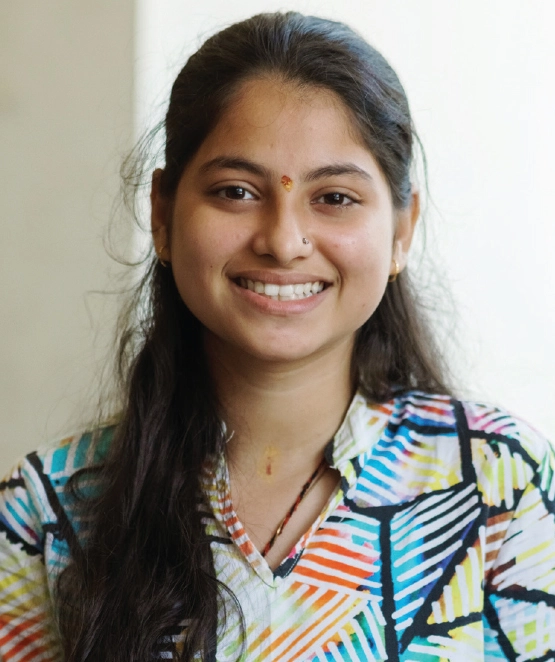
beneficiaries were girls
girls received vocational training support
children benefitted through infrastructure support
girls received scholarship support for higher studies
